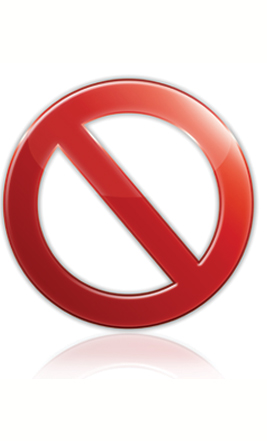Prohibited Items
This list is by no means exhaustive. Other items may be restricted or prohibited by Jamaica Customs Agency. To see what other items may be prohibited or restricted you can call Jamaica Customs at 876-922-5140-8 or visit www.jacustoms.gov.jm
NOTE: Information below can be found in the Jamaica Post Office Guide (1977), pp. 57-60
Prohibitions
It is prohibited to send by post:
1. Dangerous Articles (including explosive), inflammable, noxious, filthy deleterious or otherwise harmful substances; sharp instruments not properly protected.
2. Any indecent or obscene print, painting, photography, lithograph, engraving cinematography film, book, card, written communication or indecent or obscene article.
3. Any article having thereon or on the cover thereof any words marks or design of an indecent, obscene, seditious, scurrilous, threatening or grossly offensive character.
4. Any article consisting of or containing opium, morphia, cocaine or other narcotics except those forwarded for medical or scientific purposes to countries which permit them to be so sent.
5. Any article containing medicine of any kind unless the formula or the content is printed clearly on the container in English or French. Medicaments intended for internal or external treatment or venereal disease, are not permitted even if they comply with this condition.
6. Living animals except bees. Silkworms and leeches packed in accordance with regulations.
7. Articles which from nature or packing may expose postal officials or any other person to danger or may soil or damage other articles or postal equipment in course of conveyance.
8. Any article containing or bearing any fictitious postage stamp or any counterfeit impression of a stamping machine; purposing to be prepaid with any postal stamp which has been previously used or prepay any other postal article or any other revenue duty or tax; or having thereon or on the cover thereof any words, letters or marks (used without due authority) which signify or imply, or may reasonable lead the recipient thereof to believe that the postal article is sent on Government Service.
9. Any article containing coin or gold bullion exceeding ten dollars in value except coins use or designs for ornamental purposes and declared such.
10. Any article prohibited by postal, customs or other laws of regulation of the country or place in which the article is posted or to which it addressed or through which it must pass.
11. Carbon or soiled paper, liquid celluloid, oilskins and similar oiled goods.
12. Soil.
13. Perishable articles except when addressed to a destination within the island or when enclosed in a hermetically sealed tin.
14. Liquids unless packed as provided in the section of the guide headed “Special Packing Regulations for Certain Articles”.
15. Articles composed wholly are partly of raw celluloid roll film and cinematograph film unless packed as provided in the section of the Guide headed “Special Packing Regulations for Certain Articles”.
16. Article consisting of or containing two or more postal articles (of the same or different inscription) addresses to different person who are at different addresses.
17. Articles infringing trade mark or copyright laws.
18. Articles having anything written, printed or otherwise impressed across the postage stamps thereon before posting.
Apart from the prohibitions mentioned above, many countries abroad for various reasons, imposed restrictions on the importation of certain articles. Thus the importation of:
• Harms may be restricted in the interest of public security;
• Pharmaceutical preparations, fresh meat and other foodstuffs, soiled clothing in the interest of public health.
• Plants and parts of plants including fruits, especially the vine in the case of vine growing countries, usually for the prevention of spread of phylloxera;
• Hides, skin, wool and other external parts of animals, for the protection of animals against contagious diseases.
• Tobacco, playing cards, salt, as subject to State Monopoly.
• Lottery tickets.
• Intoxication liquors.
Articles so restricted can, as a rule, be sent if they comply with certain conditions and in some cases a sanitary certificate in a prescribed form is necessary. In general, plants must be packed securely in such a way that they can be easily examine and where a phylloxera or other sanitary certificate is required, the dispatch note, customs declaration and the cover of the parcel should be noted for example, “Phylloxera certificate annexed.
Parcels containing articles known to be prohibited from importation into the country of destination are not forwarded but are returned to the senders; parcels declared to contain articles of which the importation is permitted only under certain condition will, generally speaking, be accepted and dispatched. The onus of ensuring compliance with these conditions rests with the sender, and Jamaica Post Office accepts no responsibility for the return or seizure of any parcels through the failure of the sender or addressee to comply with the necessary formalities.
Categories of dangerous Articles: Brief description and examples
- Explosive: comprising all compounds, mixtures, or appliances which might provoke an explosion or an explosive effect. This covers all detonators, explosive or otherwise, ammunition, fireworks or similar articles which could explode following a collision, from friction or because of a rise in temperature e.g. cartridge detonators, ammonium nitrate, fireworks, fuses, gun cotton, gun powder, explosives however weak the effect, lighter fuel, etc.
- Inflammable liquids: these consist of liquids having a flash point below 150˚F. Exceptions are made for liquids such as paints, varnishes, etc., having flash point between 90˚F. And 150˚F. Subject to certain restrictions on quantity and packing.
- Inflammable solids: these consist of substances not classed as explosive and which under certain conditions might in transit involve the risk of causing or encouraging fires either by friction absorption or moisture or by spontaneous chemical changes (e.g. celluloid (raw unseasoned or liquid), matches, metallic potassium, certain metallic powders, metallic sodium) oiled tissues not having been properly dried, phosphorous, pyroxylin, plastics, etc.)
- Compressed gases: consisting all inflammable and non-inflammable, liquefied, dissolved and poisonous gases under pressure (e.g. acetylene, carbonic acid, chlorine, fluorine, hydrogen, e.g. liquid petrol, oxygen etc.)
- Corrosive liquids: all substances such as acid, caustic liquid, alkaline and other corrosive liquids, which when they come into contact with living tissues, gravely endanger those tissues by chemical action; or which in case of leakage would bleach ordinary writing ink and entail the risk of damage or destruction of other mail (e.g. solution with a bromine base, potassium lye, caustic soda, calcium chloride, chromic acid, hydrochloric, hydrofluoric, nitric and sulphuric acids).
- Oxydizing substances: substances such as bichromates, chlorates, nitrates perchlorates, permanganates, peroxides, which easily releases oxygen and stimulate combustion of other materials.
- Poison: these consist of liquid or solid giving off poisonous or irritating vapour or gases, or of substances, which could be dangerous when they come in contact with the skin or if they were absorbed (e.g. Alkaloids, aniline, arsenical compounds, powdered metallic beryllium, cyanides, mercury compound, weed killer, etc.). Certain exceptions are made, but they have to be specially authorized.
- Radioactive Materials: Item containing radioactive materials, whose contents, and make-up comply with regulations of the International Atomic Energy Agency providing special exemptions for certain categories of items, may be accepted subject to prior consent of the competent authorities. The sender must affix a special white label bearing the word “Matieres Radioactive” (Radioactive Materials), which label shall be officially crossed out, should the package be returned to the place of origin. These items must also bear in addition to the name and address of the sender, a request in bold letter for the return of the parcels in the event of non-delivery. The sender must give his name and address and the contents of the parcel on the inner wrapper. Examples: Luminous dial, radioactive isotopes.
- Other dangerous articles: Comprising those articles which although not the above categories have noxious or irritant properties; solids which dampness renders corrosive; or again substances having other inherent properties which could endanger human life or damage other mails (e.g. acetaldehyde of ammonia, suphate, ammonia, brewers yeast, non-pressurize liquid gases, potassium and sodium hydroxide, etc.).
Imports – Prohibitions (special)
Unless previous written permission has been obtained from the Minister of Agriculture of Jamaica, it is prohibited to import into Jamaica by post the following:-
Bees, honey and material used by bees raiser; boots used previously by workmen on banana plantations; cotton and all plants originating in any country other than Great Britain.
The written permit of the Minister of Agriculture which takes the form of a label bearing particulars of the permit and the seal of the department must be forwarded by the importer to the supplier who shall attached it to the package containing the plant to which the permit relates.
Import licenses are required for many items and these should be obtained in advance by the addressees.
Contagious abortion vaccine, live or dead (organisms of the Brucella group), rabies vaccine, foot and mouth disease and contagious bovine pluero-pneumonia vaccine or antigen.
All specific organism or agents (of bacterial, protozoan and virus nature) except rat viruses, which are known to cause infectious animal disease, save and except in the form of substances commonly know as vaccines, sera, toxins, antitoxins, and antigens intended for use in the practice of human or veterinary medicine, provided the said substances (vaccines, sera, toxins, antitoxins and antigens) are imported in a package labeled or marked distinctly on the outside of the package “Biological Product” and enclosing in the said package a declaration from the exporter or supplier, stating fully the contents of the said package with a description of the nature of the substances therein and indication of the maker, place and country in which they were prepared.
Fruits and vegetables (except dried or processed fruits and vegetables, grains, seeds and Irish potatoes) are prohibited in the mail to Jamaica from the United States, unless accompanied by a certificate issued by a representative of the United States Department of Agriculture attesting that the products are home grown, and are the products of a State in which the Mediterranean fly (Ceralitis capitiata), does not exist.
The following articles are absolutely prohibited: – Coffee, rum, shaving brushes, manufactured in Eastern countries as well as those exported from those countries; citrus fruits. It is also prohibited to import Tuberculozyne (or any other alleged cure from consumption), unless under licence.
Restricted Items
Importers are sometimes unaware of the various permit requirements as it relates to the importation of goods. As a result they have been found to be in contravention of the Customs Act. The table below itemizes goods that require a permit, certificate or license and the Government entity from which they can be obtained.
|
Restricted Items |
Requirement | Issuing Agency | Telephone/website |
| Meat/ Animals | Permit/Certificate | MOA | 977-0637
vsdpermits@moa.gov.jm |
| Red Peas | Permit/Phyto Sanitary Certificate | MOA | 977-0637
www.moa.gov.jm |
| Fruits, Vegetable, Plants & Plant Products | Phyto Sanitary Certificate/Permit | MOA | 977-0637
www.moa.gov.jm |
| Ground Provision | Phyto Sanitary Certificate/Permit | MOA | 977-0637
www.moa.gov.jm |
| Pharmaceuticals Chemicals, Herbal Teas | PSD Certificate | PRAD/MOH | 922-3851 or 967-1100 |
| Firearms & accessories, Explosives, Fireworks, Swords | Permit/license to Import | MONS/Trade Board | 906-4908 or 967-0507 |
| Sugar | License | Trade Board | 967-0507 |
| Coconut Derivatives, Oil, Producing Seeds, Edible Oils, Soaps | Permit | Coconut Industry Board | 926-1770 |
| Motor Vehicles | License | Trade Board | 976-0507 |
| Alcohol in Bulk | Spirit Pool Permit | Spirit Pool Association Ltd | 968-4455 |
| Human Remains | KSAC Permit | Kingston & St. Andrew Health Dept. MOH | 967-1100-1 or 922-2587 |
| Pesticides | Permit | Pesticides Control Authority | 906-6939 |
| Milk Powder, Milk Based Products | License/Permit | MOA | 977-0637
www.moa.gov.jm |
| Radios (Two Way) | License/Approval | Spectrum Management Authority | 948-7800 |
| Coffee | Permit needed if more than 5kg/11 lbs | Coffee Industry Board | 758-1259
datacoodinator@ciboj.org |








